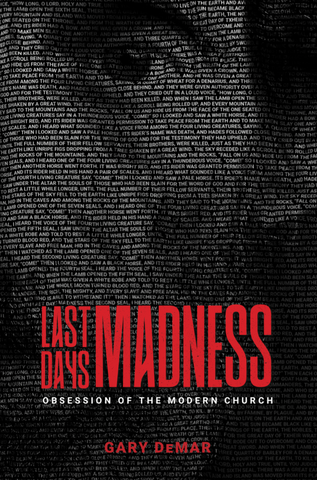Gary continues responding to Pastor David Jeremiah’s interview and book, The Great Disappearance.
All of the texts used to support the rapture theory presuppose the validity of the theory, a theory that does not have a single text to support it. The doctrine has been constructed before texts have been evaluated.
This unsound approach to Bible interpretation has done little to dissuade the adherents of the various rapture theories. Grant R. Jeffrey, for example, begins with Revelation 4:1 as one of the “five definitive indications supporting the pretribulation Rapture.”[1] Here’s how the argument goes for those who see the rapture of the church in this verse:
• The voice that John heard was “like the sound of a trumpet speaking.” When Jesus returns to rapture His church, He will do so “with the trumpet of God” (1 Thess. 4:16). • Since a trumpet is used just prior to the rapture in 1 Thessalonians 4:16, we should assume that a rapture is in view when “a door [is] standing open in heaven,” presumably to receive the raptured church (Rev. 4:1–2). • The church is no longer mentioned in the book of Revelation; therefore, the church must have been raptured. • John’s being directed to “Come up here” is a depiction of the rapture in the same way that the church will be “caught up” at the time of the pre-tribulational rapture. Jeffrey writes, “When John was ‘in the Spirit’ … he was ‘Raptured up’ to Heaven….”[2]
This is absurd exegesis to be sure, but it is standard dispensational teaching.[3]
The pre-tribulational rapture doctrine assumes that the seventieth week of Daniel is separated from the sixty-ninth week and is yet to be fulfilled. The dispensational interpretation also assumes that the book of Revelation was written about a time period in the remote future rather than for the people for whom events were to happen “shortly” (Rev. 1:1). For the readers of the prophecy in the first century, “the time is near” (1:3). The book of Revelation was written before A.D. 70. Its purpose was to describe events leading up to and including the destruction of Jerusalem. The evidence for a pre-A.D. 70 date is overwhelming.[4]
For one thing, the temple was still standing when John received the Revelation and wrote it down for the “seven churches” (Rev. 11:1–2), churches that were in existence in John’s day. Jesus assured the first readers of Revelation that He would be coming “quickly” (2:16; 3:11; 22:7, 12, 20). Those who claim to hold a literal interpretation want to avoid the obvious conclusion of these verses—the prophecy is describing events that refer to the first-century church. This does not mean that the book of Revelation has no meaning for today’s church. The crucifixion occurred before the destruction of Jerusalem in A.D. 70, and no one claims that Christ’s death has no meaning for today. Numerous events in the Old Testament are history, but they have meaning and application for our day as well: “Now these things happened to them as an example, and they were written for our instruction, upon whom the ends of the ages have come” (1 Cor. 10:11).

Last Days Madness
In this authoritative book, Gary DeMar clears the haze of "end-times" fever, shedding light on the most difficult and studied prophetic passages in the Bible, including Daniel 7:13-14; 9:24-27; Matt. 16:27-28; 24-25; Thess. 2; 2 Peter 3:3-13, and clearly explaining a host of other controversial topics.
Buy NowGary continues responding to Pastor David Jeremiah’s interview and book, The Great Disappearance. The major problem for rapture proponents like Pastor Jeremiah is the complete lack of biblical evidence of what they say is “ready to happen any minute.” Verses and passages need to be cherry-picked and strung together like a jigsaw puzzle to make their system “work.” Even then, it still doesn’t make biblical sense.
Click here for today’s episode
Click here to listen to Part One
Click here to browse all episodes of The Gary DeMar Podcast
[1] Grant Jeffrey, Armageddon: Appointment with Destiny (Toronto: Frontier Research, 1988), 135.
[2] Jeffrey, Armageddon, 136.
[3] See Hal Lindsey, The Rapture (New York: Bantam Books, 1983), 88–91.
[4] See Kenneth L. Gentry, Jr., Before Jerusalem Fell: Dating the Book of Revelation, 2nd ed. (Atlanta, GA: American Vision, 1999).

